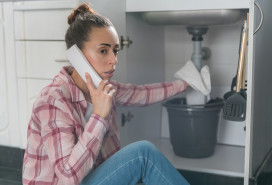Bedbugged!
Bedbugged! What not to say to someone who is battling bed bugs

Bedbugged! is a weekly column by journalist and bed bug survivor Theresa Braine. For more, click here.
When I was going through my possessions during one of my two bed bug infestations, I came across a pile of old letters from a childhood friend. We were still in touch — though electronically, since it was now the 21st century — and these missives comprised vintage high-school-boyfriend archive lore, among other apocryphal teen information.
So I dropped her an e-mail asking her if she wanted them back.
“How do I know they don’t have bed bugs in them?” was her reply.
I was as steamed as I wanted those nasty little bed bugs to be.
“Of course I wouldn’t send you anything with bed bugs in them,” I shot back in irritation. “For one thing, they weren’t anywhere near my bed. For another, they were sealed up in a plastic bin. Thirdly, just in case #1 and #2 didn’t work, I baked them in this device that heats them up to bug- and egg-killing temperatures.”
I went on to explain the Pack-tite and all the other things one does to avoid infesting one’s nearest and dearest, giving her way more detail than she needed. But it worked. She was cowed.
It wasn’t her fault. She had unwittingly said one of the many things that people, well-meaning or not, blurt out in knee-jerk response to the revelation that you are dealing with a bed bug infestation.
These things are understandable, to an extent. They are an act of mental self-preservation, of reassuring themselves that it won’t happen to them (although of course it may very wel l— though not because of you).
Such comments stem from a lack of understanding of bed bugs and what they do, what they are attracted to and how one acquires them. Since bed bugs are disgusting, people assume those infested with them are disgusting too. Since self-respecting people tend not to regard themselves as disgusting, they think they are immune from bed bugs. Thus, the (often subconscious) reasoning goes, if I do not have disgusting habits and environs, my apartment will not get infested.
This, of course, is the stuff of stigma, not of bed bug prevention.
The truly ignorant translate all that logic into statements such as, “I won’t get bed bugs because my house is spotless,” or, “I only stay in good hotels.”
But there are things one simply should not say. Things like, “Your house must be filthy.”
For one thing, that is kicking someone when they’re down. For another, it denotes a distancing of oneself from the problem — the person is more interested in protecting herself from the idea that it could happen to her too, than she is in sympathizing with you — while doing nothing to either help you through it or keep bed bugs out of her own digs.
Or, they worry that they are going to get bed bugs from you, even if you have been nowhere near the things for months. In other words, they associate you with bed bugs.
Like the time a relative called me, with a tentative hello.
“How’s your bed bug situation?” he asked. I had just finished extracting from the infested pad and was running around my parents’ house, wringing my hands like Lady Macbeth at the idea that some bug or egg might have lived through the intense baking and drying after all, and wailing, like Schindler, “I could have done more!”
That didn’t stop said family member from saying, “I saw a bed bug crawling up my cubicle wall at work, and I just wanted to know whether your place still has them or not.”
Of course, he meant no harm. And later he said he had actually been calling to plumb my bed bug expertise. But I had visited him the previous weekend, so naturally it was at the back of both our minds that somehow something had gotten into his house, then his car, then his office.
I consulted one of the many bed bug experts I have on speed dial, who told me that the likelihood of my having transmitting anything to anyone, and of that having been transmitted to a third location, was extremely remote.
“He would have to have a pretty substantial infestation to be bringing bugs to work,” my expert said, in essence. “If he inspects his house and finds nothing, then it would be virtually impossible for him to have brought bugs to work. And it almost certainly would not have come via you.”
As it turned out, the culprits were most likely some cartons of files that my family member had brought back from a conference. They had been sitting in a hotel for a few days. But then again, the bugs could have come from anywhere. That’s the thing: We never really know where they come from.
But that doesn’t stop your friends and loved ones from saying things that make you wince.
I didn’t have houseguests during my two infestations, at least not once I knew about them. But once a friend was stranded and had to crash at my treated apartment overnight. He woke up freaking out. “Do I have bed bugs in my hair?” he asked.
“Bed bugs don’t hang out in your hair,” I said. “That’s lice.”
So I dropped her an e-mail asking her if she wanted them back.
“How do I know they don’t have bed bugs in them?” was her reply.
I was as steamed as I wanted those nasty little bed bugs to be.
“Of course I wouldn’t send you anything with bed bugs in them,” I shot back in irritation. “For one thing, they weren’t anywhere near my bed. For another, they were sealed up in a plastic bin. Thirdly, just in case #1 and #2 didn’t work, I baked them in this device that heats them up to bug- and egg-killing temperatures.”
I went on to explain the Pack-tite and all the other things one does to avoid infesting one’s nearest and dearest, giving her way more detail than she needed. But it worked. She was cowed.
It wasn’t her fault. She had unwittingly said one of the many things that people, well-meaning or not, blurt out in knee-jerk response to the revelation that you are dealing with a bed bug infestation.
These things are understandable, to an extent. They are an act of mental self-preservation, of reassuring themselves that it won’t happen to them (although of course it may very wel l— though not because of you).
Such comments stem from a lack of understanding of bed bugs and what they do, what they are attracted to and how one acquires them. Since bed bugs are disgusting, people assume those infested with them are disgusting too. Since self-respecting people tend not to regard themselves as disgusting, they think they are immune from bed bugs. Thus, the (often subconscious) reasoning goes, if I do not have disgusting habits and environs, my apartment will not get infested.
This, of course, is the stuff of stigma, not of bed bug prevention.
The truly ignorant translate all that logic into statements such as, “I won’t get bed bugs because my house is spotless,” or, “I only stay in good hotels.”
But there are things one simply should not say. Things like, “Your house must be filthy.”
For one thing, that is kicking someone when they’re down. For another, it denotes a distancing of oneself from the problem — the person is more interested in protecting herself from the idea that it could happen to her too, than she is in sympathizing with you — while doing nothing to either help you through it or keep bed bugs out of her own digs.
Or, they worry that they are going to get bed bugs from you, even if you have been nowhere near the things for months. In other words, they associate you with bed bugs.
Like the time a relative called me, with a tentative hello.
“How’s your bed bug situation?” he asked. I had just finished extracting from the infested pad and was running around my parents’ house, wringing my hands like Lady Macbeth at the idea that some bug or egg might have lived through the intense baking and drying after all, and wailing, like Schindler, “I could have done more!”
That didn’t stop said family member from saying, “I saw a bed bug crawling up my cubicle wall at work, and I just wanted to know whether your place still has them or not.”
Of course, he meant no harm. And later he said he had actually been calling to plumb my bed bug expertise. But I had visited him the previous weekend, so naturally it was at the back of both our minds that somehow something had gotten into his house, then his car, then his office.
I consulted one of the many bed bug experts I have on speed dial, who told me that the likelihood of my having transmitting anything to anyone, and of that having been transmitted to a third location, was extremely remote.
“He would have to have a pretty substantial infestation to be bringing bugs to work,” my expert said, in essence. “If he inspects his house and finds nothing, then it would be virtually impossible for him to have brought bugs to work. And it almost certainly would not have come via you.”
As it turned out, the culprits were most likely some cartons of files that my family member had brought back from a conference. They had been sitting in a hotel for a few days. But then again, the bugs could have come from anywhere. That’s the thing: We never really know where they come from.
But that doesn’t stop your friends and loved ones from saying things that make you wince.
I didn’t have houseguests during my two infestations, at least not once I knew about them. But once a friend was stranded and had to crash at my treated apartment overnight. He woke up freaking out. “Do I have bed bugs in my hair?” he asked.
“Bed bugs don’t hang out in your hair,” I said. “That’s lice.”
Theresa Braine is a NYC-based journalist and bed bug survivor whose work has appeared in the NY Daily News, People, Newsday and other outlets. Bedbugged! is her weekly column about life in the trenches and climbing out with your sanity intact.
Brick Underground articles occasionally include the expertise of, or information about, advertising partners when relevant to the story. We will never promote an advertiser's product without making the relationship clear to our readers.
























